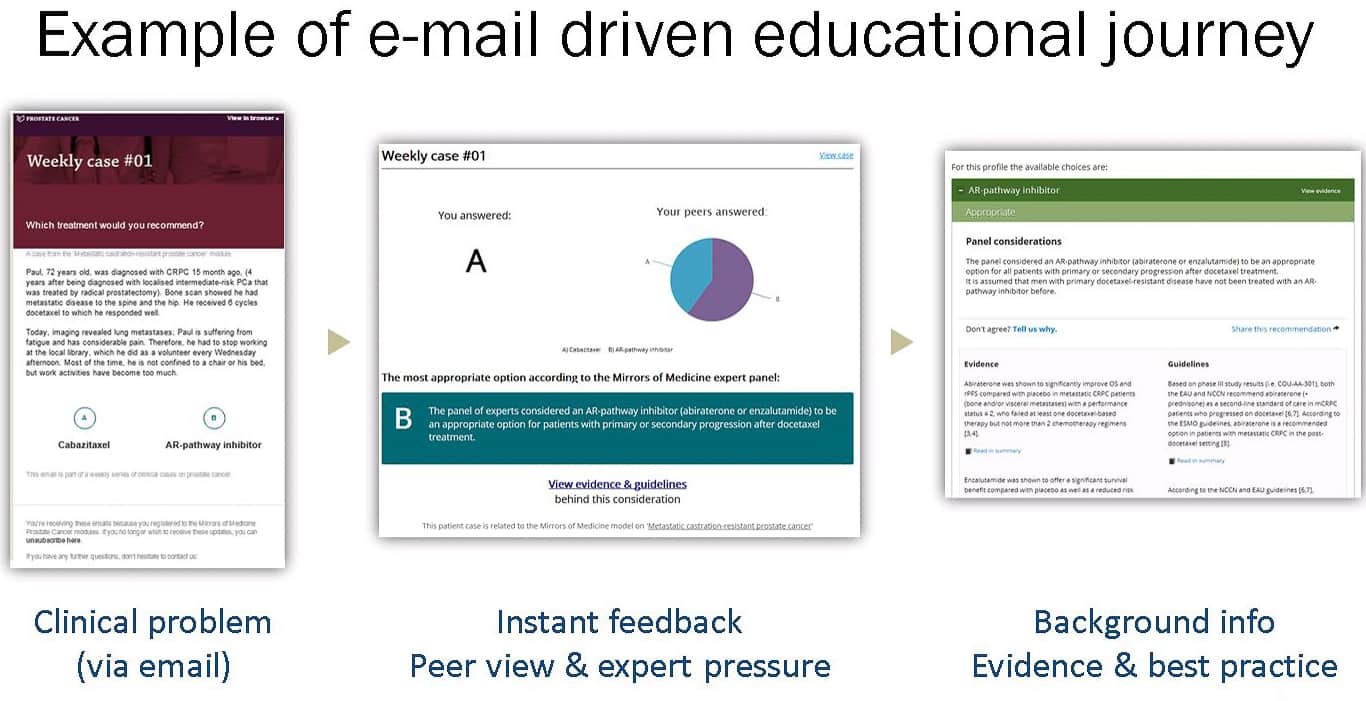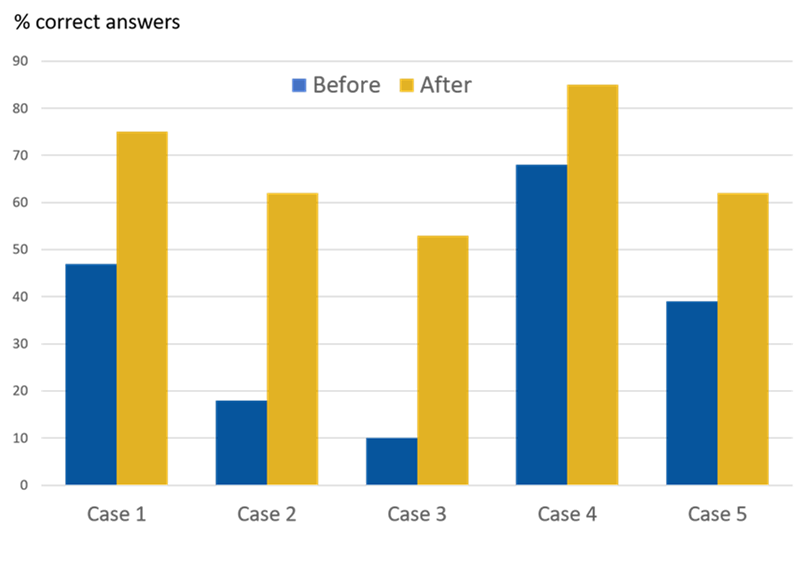For many physicians keeping pace with their field of practice gets harder every day. They are working long hours and it is complicated to keep-up-to date with all new data. It becomes increasingly difficult to find time to regularly follow CME courses or attend international congresses. This lack of time to learn contradicts with the increasing need for continuous education. Moreover, current CME in various formats is often not optimal and time consuming.
Wouldn’t it be great if CME could be more like sushi? Little pieces of easy-to-consume, relevant, up-to-date learning encounters taking only a few minutes?
Online micro-CME: the Weekly Cases
The Weekly Cases is an email subscription programme with easy-to-consume clinical dilemmas. On a weekly or biweekly basis, subscribers get a clinical case in their mailbox. The case gives a concise description of relevant clinical information and contains 1 question: Which treatment would you recommend for this patient? There are only 2 options: A or B.
When choosing an option, the subscriber gets immediate feedback on what his peers answered and the recommendation on the appropriate answer from an international expert panel. This is backed-up by scientific evidence and guideline information.
Online micro-CME: does it work?
What started as an experiment in the field of prostate cancer, became a hit. For the first series of 50 cases, 37% of weekly emails were opened, and 60% of these led to active participation (overall conversion rate 22%)1. About one-third of the participating physicians completed a case at least once a month. But numbers don’t tell it all. Subscribers to the Weekly cases described it as: challenging, fun, accurate, concise, super, practical, exciting, addictive, brilliant…
Also with biweekly cases in the field of lower urinary tract dysfunction a high conversion rate, considerable number of returning visitors and positive feedback was received, suggesting this weekly case format to be an attractive new form of micro-CME.

The Weekly Cases reflect on a diversity of relevant patient cases in a simple yet challenging and to-the-point way. It not only enables a personal knowledge check via summary of the available evidence and international guidelines, but also provides feedback from experts and allows comparison of treatment decision making with peers
Online micro-CME: Concept test
In cooperation with Prof. Nele Michels from the University of Antwerp, Belgium a survey was sent out to examine if online micro-CME is really effective [2]. This online survey was completed by ~100 European general practitioners (GPs). It consisted of 5 short clinical cases for which the GP had to choose the most appropriate treatment or most likely diagnosis. Thereafter the participants were shown the recommendation from an expert panel, and a summary of scientific evidence and/or guidelines. Then the GPs were asked to reconsider their answers in light of the presented evidence.
The results were very encouraging!
After presenting the evidence the percentage of correct answers increased from 36% to 67%. Moreover, ~75% of GPs found the cases very relevant for their practice and the concept of micro-CME very useful.

Accredited online micro-CME: the Pinpoint Case Platform
We are convinced that micro-CME, like the Weekly Cases, is the future. Therefore we went 1 step further: making the Weekly Cases accredited by EACCME. Hence the Pinpoint Case Platform was born.
The Pinpoint Case Platform consists of several topics (clinical dilemmas) each containing 5 clinical cases with related evidence, similar to the Weekly Cases. After having been through the 5 cases and evidence the participant has to answer 10 multiple choice questions. If he/she gets 7 out of 10 right, 1 CME point is accredited by the EACCME.
Now, not only can physicians get fast, easy-to-consume, high-quality medical education, they can also earn accreditation points. And it’s fun to do!
Micro-CME: what’s in it for you?
“Pinpointing” clinical dilemmas in daily practice and providing concise and targeted feedback seems to be an effective new form of CME. It can help to reduce variations from best practice and increase appropriate adoption of innovative therapies. It’s a fast and easy way to get new information to the healthcare professional, not only online, but also offline, as the cases can be easily translated in a challenging, interactive meeting concept. Key analytics are implemented which allows us to monitor learning effects and to refine the strategy, ensuring lasting product adoption.
Convinced that CME should be more like sushi?
Interested to hear how micro-CME can support appropriate adoption of your drug, device or diagnostic procedure?
Please, don’t hesitate to contact us!
More reading
- Stoevelaar H, Yperman J, De Loore W, et al. One year experience with micro-CME in prostate cancer: less is more? Presented at the 5th Global Congress on Prostate Cancer. Lisbon, Portugal, 28-30 June, 2017. Available at: https://abstracts.mirrorsmed.org/abstracts/one-year-experience-micro-cme-prostate-cancer-less-more
- Michels N, Rees J, Andreeva E, et al. Online micro-CME: an efficient way of education in family medicine? Presented at the 2nd EURACT Medical Education Conference 2018. Leuven, Belgium, 21-22 September, 2018
